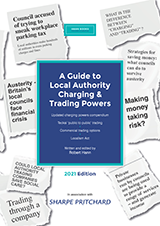Local Authority Charging and Trading Powers (LACAT)
 The essential guide for English local authorities seeking to lawfully generate income from their statutory powers.
The essential guide for English local authorities seeking to lawfully generate income from their statutory powers.
 The essential guide for English local authorities seeking to lawfully generate income from their statutory powers.
The essential guide for English local authorities seeking to lawfully generate income from their statutory powers.
Author: Rob Hann
Cost: £25 for hard copy OR DOWNLOAD FOR FREE (Registration required)
An essential compendium of local authority charging powers, this comprehensive guide will prove invaluable to all practitioners involved in generating income for local authorities via charging for their services. It also enables local authorities to examine whether they are making the most of their statutory charging powers.
Dealing with the whole area topic-by-topic, the work identifies and examines when and how a local authority is statutorily empowered to charge for a service.
Coverage includes:
- planning functions and economic development
- environmental health and protection
- education and related services
- social services and community care
- law and order/emergency services
- street parking and market trading
- highway and transport functions
- consumer protection
- libraries and museums
- housing
- general licensing functions
- animal health
- an overview of charging powers
Where relevant, the author examines important case law, such as R v Richmond Upon Thames LBC, ex parte McCarthy and Stone (Developments) Limited, where the House of Lords decided that existing legislation did not extend to an authority imposing a charge on a developer for pre-application advice.
Local Authority Charging and Trading Powers deals with the whole area in a simple topic-by-topic format, keeps local authorities fully informed of what services they can or cannot charge for so that their activities are not deemed ultra vires.
About the author
Rob Hann is an experienced solicitor, specialising in local government law. He has worked for many years in the public sector on major infrastructure projects, the PFI and helping local authorities to commercialise services through trading companies and other vehicles. He has also helped several authorities to bid for devolution and setting up combined authorities.
He is a regular author of articles and publications as well as two major local government textbooks and a ‘sister’ publication to LACAT – A Guide to Local Authority Companies and Partnerships (‘LACAP’).
|
Changes since the publication of the 2020 Guides to Local Authority Charging and Trading (‘LACAT’) and LA Companies and Partnerships (‘LACAP’). A Note from the Author and Head of Local Government at Sharpe Pritchard, Rob Hann: Both my Guides LACAT and LACAP were written and published in 2020, i.e. prior to the huge changes which have now happened post 2021, namely the UK’s departure from the European Union, otherwise known as Brexit. These changes will impact on the content of both books going forward but for now, and until such time as new legislation is enacted and which departs from the processes described for EU procurement and state aid, much of the existing content will remain valid and relevant to practitioners. Now that the content of the 2020 Guides are published on-line via Sharpe Edge, there is also the opportunity to flag these changes as they happen. To that end the following significant changes should be noted: Changes to Procurement Since 1st January 2021 (the end of the ‘implementation period’ or Brexit transition period), the Public Contracts Regulations 2015 (SI 2015/102) (the “PCR”) have been amended by the Public Procurement (Amendment etc.) (EU Exit) Regulations 2020 (SI 2020/1319) (“the Exit Regulations”). The amendments introduced by the Exit Regulations do not change the analysis of the PCR in this publication, but for completeness it should be noted that amendments have been made to PCR Regulation 12 (discussed in section 5.11) to reflect the fact that the European Union (Withdrawal) Act 2018 has ‘retained’ EU law in force prior to 2021 into UK law. For more information about the impact of the Exit Regulations and of Brexit generally on the public procurement regime, please visit www.sharpepritchard.co.uk/brexit-hub. Also, while the changes made by the 2020 Regulations to the public procurement regime are relatively restrictive, in December 2020 the UK Government published a Green Paper on the transformation of procurement, and commenced public consultations, with a view to making substantive changes to the rules, including the PCR. Developments in this regard are also closely monitored and discussed on the SP website. Changes to State Aid From 1 January 2021, the EU State aid rules no longer apply to funding and other forms of support measures granted to business by UK public authorities. In place of the EU State aid rules, new provisions are set out in Chapter 3 of Title XI of the new Trade and Cooperation Agreement (the ‘TCA’). While the TCA adopts a familiar set of principles to previous EU State aid regulations, the terminology and structure of the rules the UK must adhere is very different. The concept of ‘subsidy’ replaces ‘State aid’; a recognition that the UK is no longer in the EU Single Market. ‘Subsidy’ is defined in terms very similar to the concept of ‘aid’, meaning that what would have been considered ‘aid’ before 31 December 2020 is largely likely to be captured under the Subsidy Control regime from 1 January 2021. For more information on how the new Uk subsidy regime operates see www.sharpepritchard.co.uk/brexit-hub/ |
Order details
| FREE Download | Hard copy |
| [powr-form-builder id="5d36fbf4_1614185364"] |
Cost: £25 To pay by invoice/purchase order, please email [powr-paypal-button id="20e9fb00_1613403611"] |

